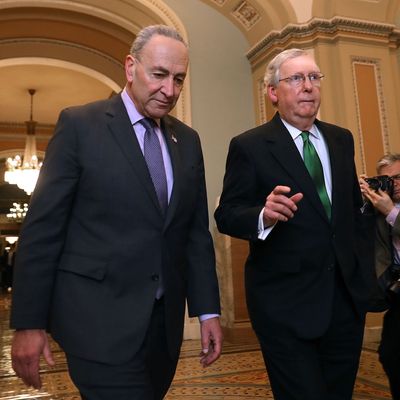
As Democrats wax optimistic about the prospects for a Biden presidential win in November, their greedy eyes look more and more at the possibility of flipping control of the U.S. Senate. A Democratic Senate would probably ensure a Biden administration could get its executive and judicial appointees confirmed while giving it a fighting chance of enacting a legislative agenda as well.
Right now, if you go by the Cook Political Report’s renowned cheat sheet, there are 11 competitive Senate races on tap in November, 9 of them involving seats currently held by Republicans and 2 held by Democrats. The Democrats need a net gain of three seats for control of the Senate, assuming Joe Biden’s veep is the tiebreaker. Since one Democratic-held seat in Alabama is in considerable peril, it may require flipping four Republican seats to get the job done. It will be a reach, but assuming Biden wins solidly, not a long reach.
Unless there is a Democratic tsunami, however, we may not know who controls the Senate for a good while after November 2. In part that’s because of likely heavy voting by mail that will delay definitive “calls” on close races. But there’s another reason for delayed gratification: one state with peculiar election laws that is home to two competitive Senate races.
In Georgia, a red state that’s been steadily turning purple in recent years, winning a general election requires a majority of the vote. If no one achieves a majority (which typically happens in razor-close contests with some minor-party voting), a runoff is held in December for state and local offices, and in January for federal offices. There have in the past been two U.S. Senate general-election runoffs, in 1992 and in 2008. If the Senate race involving Republican incumbent David Perdue and well-financed Democratic challenger Jon Ossoff ends with a plurality winner, a runoff will be held on January 5, 2021.
That’s entirely possible. In the last Senate race in Georgia, in 2016, a Libertarian candidate received over 4 percent of the vote. Perhaps that was an outlier because the major-party race (featuring incumbent Republican Johnny Isakson and Democrat Jim Barksdale) wasn’t competitive. In 2014, when Perdue was first elected after a reasonably competitive contest with Democrat Michelle Nunn, the Libertarian received just under 2 percent of the vote. That would still be enough to trigger a runoff in a very close race this year.
But there’s a second Senate race in Georgia that is quite likely to go to a runoff: the special election to choose someone to finish the term Isakson gave up at the end of last year due to poor health. Under Georgia’s rules, a nonpartisan “jungle primary” will be held the same day as the general election (November 3), and if no one wins a majority, the top two finishers will go to a January 5 runoff. There are 20 candidates who will appear on the ballot, including the interim appointed senator, Republican Kelly Loeffler. She faces fierce competition for Republican voters from congressman Doug Collins. Democratic leaders are mostly backing Ebenezer Baptist Church pastor Raphael Warnock, but early polls have shown Matt Lieberman (son of Joe) with significant support, probably because of name ID. The odds of anyone winning a majority in November are low.
Perhaps one party or the other will nail down a Senate majority on or soon after Election Day. But there’s a nontrivial chance it could all come down to Georgia in January.
The conventional wisdom is that Republicans would be favored in either or both Senate runoffs because their more affluent voters are more likely to turn out for a special election. In the two precedents we have, Republican Paul Coverdell upset incumbent Democratic senator Wyche Fowler in 1992, and Republican incumbent Saxby Chambliss easily dispatched Democrat Jim Martin in 2008. But Senate control was not at stake in either of those contests. And even though Republican Karen Handel prevailed over Jon Ossoff (the self-same candidate now opposing Perdue) in the famous 2017 special House election in the Sixth Congressional District of Georgia, turnout from both party bases was robust.
What would one or two January runoffs with the Senate at stake be like? Probably an insane frenzy with every unemployed campaign worker and every unspent campaign dollar in the whole country being deployed in one place. Whoever is president would definitely have Georgia on his mind 24/7. The vice-president (who could be Atlanta mayor Keisha Lance Bottoms or 2018 Georgia Democratic gubernatorial nominee Stacey Abrams, according to many Biden veep lists) would be waiting with gavel at the ready.
Early voting would definitely begin during the holiday season, when Americans traditionally try to think about anything and everything other than politics (particularly after what is likely to be a vicious and possibly contested general election). For all we know, COVID-19 (or fears of its reemergence) could still be inhibiting in-person political activity and complicating voting. And Georgia is quite the testing ground for get-out-the-vote efforts these days, with veteran vote suppressor Brian Kemp in the governorship and his 2018 challenger Abrams heading up the nation’s preeminent voting-rights group.
Those unfamiliar with Georgia may not realize that this Deep South state has some mighty cold weather in January. But it could be a red-hot political site in early 2021.






























